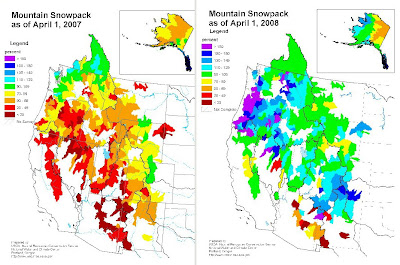
This is quite different from last year when most of the west was below normal.
But, as in an earlier post, I still believe the severity of the fire season is mostly determined by the weather in the fire season, and less so by the amount of precipitation during the winter.
Here is what the director of the Colorado State Forest Service said about the snowpack and the fire season. From the Durango Herald.
March 27, 2008
By Joe Hanel | Herald Denver Bureau
DENVER - Even though the snow is still deep in the mountains, above-average temperatures could set the stage for a bad fire season, Colorado's top forester said Wednesday.
Temperatures in Southwest Colorado are predicted to be significantly above average, and drought is likely, especially in the southeast, said Jeff Jahnke, director of the Colorado State Forest Service, during a meeting of the Legislature's two agriculture committees.
"All those things mean the potential for a significant fire season is there," Jahnke said.
Rep. Kathleen Curry interrupted him.
"The potential is there even though we have a record snowpack?" asked Curry, D-Gunnison.
Yes, Jahnke said.
"Once the snow's gone, it takes only a couple weeks of very dry, very hot weather to create the potential" for wildfires, Jahnke said.
However, Jahnke says he never makes predictions for how the fire season actually will play out. He was only saying the potential for big fires exists.
The deep snow means the fire season probably will start later than usual. And as long as the fall monsoon arrives on time, the fire season will be compressed, Jahnke said.
The Front Range has seen three fires in the last week that totaled 600 acres, he said.
Trees are still drier than normal after the drought years earlier this decade, Jahnke said.




No comments:
Post a Comment